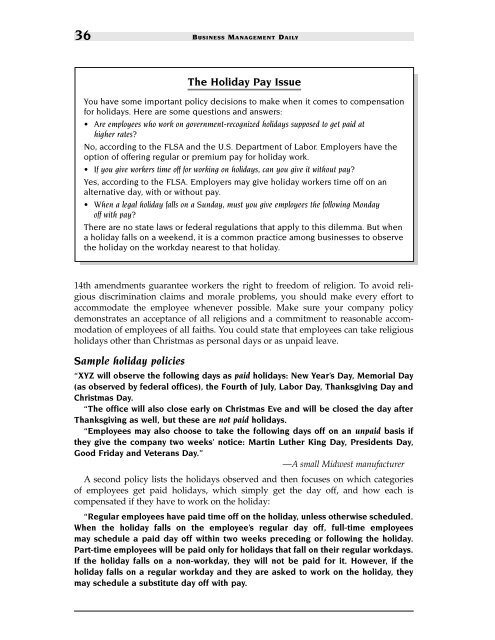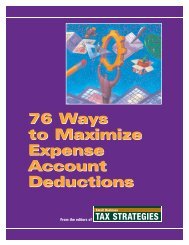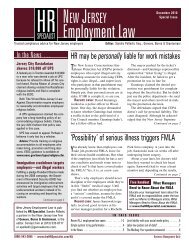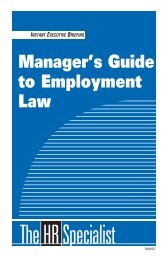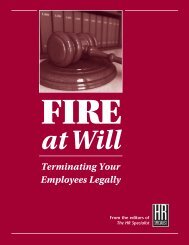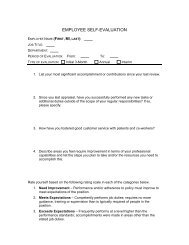sample policies
sample policies
sample policies
You also want an ePaper? Increase the reach of your titles
YUMPU automatically turns print PDFs into web optimized ePapers that Google loves.
36 BUSINESS MANAGEMENT DAILY<br />
The Holiday Pay Issue<br />
You have some important policy decisions to make when it comes to compensation<br />
for holidays. Here are some questions and answers:<br />
• Are employees who work on government-recognized holidays supposed to get paid at<br />
higher rates<br />
No, according to the FLSA and the U.S. Department of Labor. Employers have the<br />
option of offering regular or premium pay for holiday work.<br />
• If you give workers time off for working on holidays, can you give it without pay<br />
Yes, according to the FLSA. Employers may give holiday workers time off on an<br />
alternative day, with or without pay.<br />
• When a legal holiday falls on a Sunday, must you give employees the following Monday<br />
off with pay<br />
There are no state laws or federal regulations that apply to this dilemma. But when<br />
a holiday falls on a weekend, it is a common practice among businesses to observe<br />
the holiday on the workday nearest to that holiday.<br />
14th amendments guarantee workers the right to freedom of religion. To avoid religious<br />
discrimination claims and morale problems, you should make every effort to<br />
accommodate the employee whenever possible. Make sure your company policy<br />
demonstrates an acceptance of all religions and a commitment to reasonable accommodation<br />
of employees of all faiths. You could state that employees can take religious<br />
holidays other than Christmas as personal days or as unpaid leave.<br />
Sample holiday <strong>policies</strong><br />
“XYZ will observe the following days as paid holidays: New Year’s Day, Memorial Day<br />
(as observed by federal offices), the Fourth of July, Labor Day, Thanksgiving Day and<br />
Christmas Day.<br />
“The office will also close early on Christmas Eve and will be closed the day after<br />
Thanksgiving as well, but these are not paid holidays.<br />
“Employees may also choose to take the following days off on an unpaid basis if<br />
they give the company two weeks’ notice: Martin Luther King Day, Presidents Day,<br />
Good Friday and Veterans Day.”<br />
—A small Midwest manufacturer<br />
A second policy lists the holidays observed and then focuses on which categories<br />
of employees get paid holidays, which simply get the day off, and how each is<br />
compensated if they have to work on the holiday:<br />
“Regular employees have paid time off on the holiday, unless otherwise scheduled.<br />
When the holiday falls on the employee’s regular day off, full-time employees<br />
may schedule a paid day off within two weeks preceding or following the holiday.<br />
Part-time employees will be paid only for holidays that fall on their regular workdays.<br />
If the holiday falls on a non-workday, they will not be paid for it. However, if the<br />
holiday falls on a regular workday and they are asked to work on the holiday, they<br />
may schedule a substitute day off with pay.


